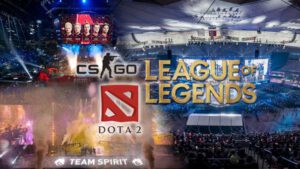The Rise of eSports: A Revolution in Gaming Culture
In the realm of competitive gaming, a revolution is underway. What was once considered a niche interest has blossomed into a global phenomenon, captivating millions of enthusiasts and spectators alike. This revolution is none other than eSports, a vibrant and dynamic industry that continues to push the boundaries of what is possible in the world of gaming.

The eSports, short for electronic sports, refers to organized video game competitions where professional players compete against each other for fame, glory, and substantial prize pools. From multiplayer online battle arenas (MOBAs) like League of Legends and Dota 2 to first-person shooters like Counter-Strike: Global Offensive and Overwatch, eSports encompasses a diverse array of gaming genres, each with its own dedicated fanbase.
One of the key driving forces behind the meteoric rise of eSports is its accessibility. Unlike traditional sports, which often require expensive equipment and specialized facilities, eSports can be enjoyed by anyone with a gaming console, computer, or smartphone. This accessibility has democratized competitive gaming, allowing players from all walks of life to participate and excel on the virtual battlefield.
Moreover, the rise of streaming platforms such as Twitch and YouTube Gaming has brought eSports to the masses, enabling fans to watch their favourite players and teams compete in real-time from the comfort of their own homes. This seamless integration of gaming and entertainment has transformed eSports into a spectator sport on par with traditional athletics, complete with dedicated fan communities, professional commentators, and lucrative sponsorship deals.
However, the appeal of eSports extends far beyond its accessibility and entertainment value. At its core, eSports represents the convergence of technology, competition, and community, creating a vibrant ecosystem that fosters innovation and creativity. From pioneering new gaming strategies to pushing the limits of hardware and software capabilities, eSports has become a hotbed of experimentation and discovery, driving the evolution of gaming culture as a whole.

Furthermore, eSports has emerged as a powerful platform for diversity and inclusion, providing opportunities for players of all backgrounds to showcase their skills and talents on a global stage. Unlike traditional sports, which have historically been male-dominated, eSports boasts a diverse and inclusive player base, with women, LGBTQ+ individuals, and people of color making significant strides in the industry.
As eSports continues to gain momentum, its impact on popular culture and mainstream society cannot be overstated. Major corporations and brands are increasingly recognizing the value of eSports as a marketing platform, investing millions of dollars in sponsorship deals, advertising campaigns, and live events. This influx of capital has fueled the growth of the industry, paving the way for larger prize pools, higher production values, and greater opportunities for players and teams alike.
In conclusion, eSports represents a seismic shift in the landscape of gaming culture, transforming what was once a niche hobby into a global phenomenon with widespread appeal. With its accessibility, entertainment value, and potential for innovation, eSports is poised to continue its ascent, captivating audiences and inspiring the next generation of gamers for years to come. As we embark on this thrilling journey into the future of competitive gaming, one thing is certain: the revolution is just beginning. 
Related Posts
Februar 25, 2024
What makes a startup successful?
Just the other day I happened to wake up early. That is unusual for an…


